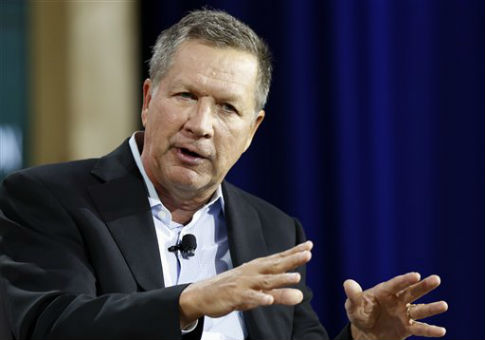Presidential candidate Gov. John Kasich said on Wednesday that he would take a wait-and-see approach to the Iran nuclear deal, arguing that if Tehran is found to be aiding Hezbollah and Hamas then the United States could "slap the sanctions back on."
"This agreement, we don’t know what’s going to happen in 18 months," said Kasich in the Wednesday night Republican debate. "If [the Iranians] cheat, we slap the sanctions back on. If they help Hamas and Hezbollah, we slap the sanctions back on."
Iran already funnels between $100 million and $200 million annually to Hezbollah, its main terror proxy. The regime also reportedly delivered tens of millions of dollars to Hamas over the past year.
According to the U.S. State Department, Iran is the world’s most active state sponsor of terrorism and has long channeled millions to various terrorist groups around the world.
Supporters of the Iran nuclear deal say the United States will be able to quickly restore sanctions if the Iranians are found to be cheating on the agreement, by bringing the evidence to the United Nations Security Council. But some experts question the effectiveness of this mechanism.
"The only thing you’ll take to the Security Council are massive Iranian violations because you’re certainly not going to risk the Iranians walking away from the deal and engaging in nuclear escalation over smaller violations," the Foundation for Defense of Democracies’ Mark Dubowitz told NPR in July. "And it will be very difficult to convince European companies to leave Iran again. It took decades to convince the Europeans to leave the first time."
Kasich’s comments came during a clash with Ted Cruz in the Republican debate, after Cruz said he would rip up the Iran nuclear deal on his first day as president.
"You better believe it, if I am elected president on the very first day in office I will rip to shreds this catastrophic Iranian nuclear deal," said Cruz.
While Kasich said he believed it was "a bad agreement" and he "would never have done it," he argued that it was unserious for the next president to revoke the deal immediately.
"I served on the defense committee for 18 years. I’ve seen lots of issues in foreign affairs and in terms of global politics. You have to be steady," he said.
Kasich added that, "if we find out that [Iran] may be developing a nuclear weapon, then the military option is on the table."
